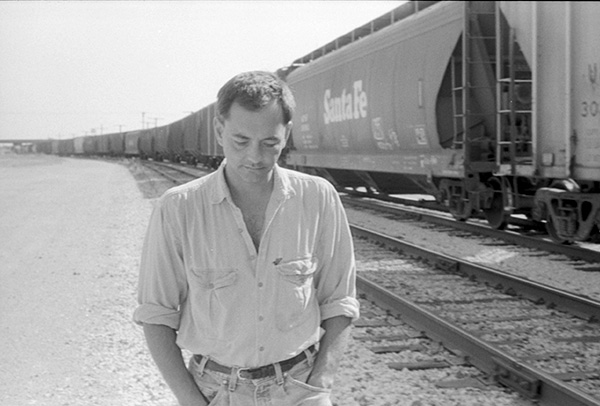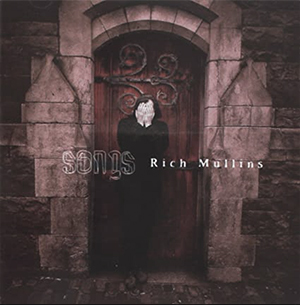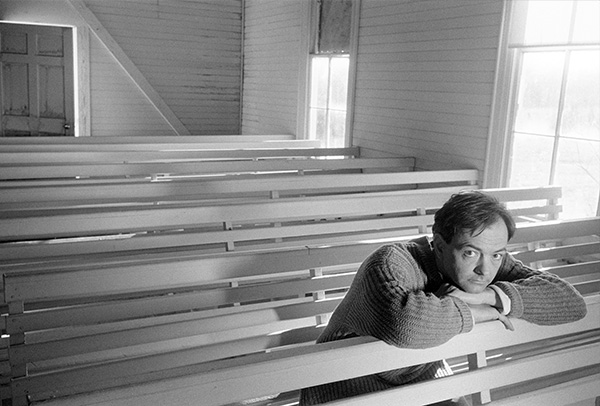Subtotal: $
Checkout
Rich Mullins: Ragamuffin, Celebrity, Disciple
The singer-songwriter defined a generation of Christian music but sought a Christ-like response to wealth and fame.
By Bethel McGrew
September 17, 2022
It was a day before the show, and the auditorium was empty. A group of teenagers had traveled a thousand miles to get to the Denver church for a Christ in Youth conference. A twenty-year-old college student named Jay was chaperoning them. But he had a break and time to kill with a friend. Wandering through the quiet space, Jay drifted to the grand piano on stage and started picking out the chorus to a favorite new song he hoped to hear at the next day’s concert: “Awesome God”:
Our God is an awesome God
He reigns from heaven above
With wisdom, power, and love
Our God is an awesome God
He wasn’t very good, and he was missing chords. As he played, he looked up and saw that his friend was staring past him, suddenly awestruck. Before he could see why, a man was sitting down on the bench next to him. “Are you trying to play this?” the man asked, putting his own hands on the keys. Jay nodded and stared for a confused beat. “Did anyone ever tell you you look like Rich Mullins?” he finally asked. “And man, you even play like him.”
The man grinned and laughed. “Yeah. I’ve heard that before.”
Of course, Rich Mullins would never have told young Jay the truth he shared years later with another group of fans, at another concert, when he stopped playing the worship chestnut mid-flight to say, “Sorry, guys. I just hate this song.”
I first learned the ubiquitous chorus as a child of the late 1990s, sitting in a circle with other children in a church basement. While our moms did Bible study, the church ladies rotated CDs of praise songs until we had them down. “Awesome God” came with the bonus of sign language. “Wisdom, power, and love”: point to your head, flex muscles, cross your arms like you’re getting blessed.
I’m too young to remember the night of September 19, 1997, when a Jeep careened out of control and threw its driver into the path of a truck. I’m too young to remember the day the music died.
Twenty-five years later, “Awesome God” has fallen out of use, as Mullins himself predicted. What he didn’t predict was that his legacy would inspire a whole generation of younger musicians. A new tribute album, Bellsburg, acknowledges their debt to CCM’s poet laureate – a man who has been variously labeled a genius, a prophet, a mystic, and, in his less shining moments, “a real jerk.”

Rich Mullins in Wichita, Kansas, 1993. Photograph by Ben Pearson
You might have called him a frustrated struggling artist: a successful artist who never wanted to succeed. When Myrrh records first called to say Amy Grant wanted to record his song “Sing Your Praise to the Lord,” he nearly hung up. But it would be a hit, the first of many. He wrote naturally to the people, complementing his poetic lyricism with a good pop writer’s ear for how to convey profound ideas simply. His arrangements were an eclectic fusion of pop and folk, most famously introducing radio to his signature instrument, the hammered dulcimer. This was the secret sauce that made hit singles out of songs like the atmospheric Western nature poem “Calling Out Your Name” – a tune which, by all the rules of hit singles, should never even have been on the air. As one fan put it, Mullins was weird, but he was also so good that radio had to play him.
Despite all of this, he was dead before he won a Dove Award. Perhaps this was only fitting, given his opinion of the Dove Awards. Not that he was fishing for Grammys either. He never sought to reinvent himself as anything other than a Christian artist. “What else would you write about,” he once asked rhetorically, “if you knew God Almighty?”
Among his songwriting peers, few wrote more eloquently about God than Mullins, whether he was contemplating wanderlust, children, death, the persecuted church, the sacraments, or even the color green. But perhaps his most enduring classic is the spare “If I Stand,” a simple expression of yearning from “a man who is longing for his home.” His songs are haunted by writers like C. S. Lewis, G. K. Chesterton, and Thomas Merton, while still bearing an original stamp. The same is true of his occasional prose articles, which offered striking glimpses of an original literary talent. Sadly, he only produced a slim book’s worth of these essays, collected and published after his death.
As compelling as his writing was, his appeal was impossible to appreciate fully without experiencing him live. To attend a Rich Mullins concert was to encounter a scruffy, mercurial old soul who seemed equal parts Bruce Springsteen, Francis Schaeffer, and Norm Macdonald. Within a single stage “bit,” he could pivot from sentimental to sarcastic, from morbid to uplifting. He once told a Wheaton College audience that he liked to play dumber than he was, “to disarm the heathen. They don’t get all defensive if they think that you’re just a bumbling idiot.” Here he grinned. “Just part of my charm.”
That disarming self-awareness, that breaking of the fourth wall, made Mullins sui generis in the CCM market. Not that he wasn’t a professional. He would remind his audience that they knew “what I’ve chosen for you to know.” He never told them the darkest extent of his struggles with mental illness and alcohol abuse. But sometimes, he chose for them to know that songs like “Hold Me Jesus” were written while he was trying not to “take a walk and be tempted.”
It seems strange that such a consummate showman would record his albums’ lead vocals in the dark, with his back to the control room. Yet if it had been left up to him, his face would have been left off all his album covers.

Songs album cover, released July 30, 1996
He got his way most poignantly on the front cover of his first greatest hits album, Songs, which shows him standing in a church doorway with his face in his hands. Many earnest evangelical fans were no doubt a little confused by the iconography and statuary filling that record’s lyric pages in lieu of studio photos.
Mullins always fell between denominational stools, rooted in Protestantism but drawn to Catholicism. Liturgy infused his art, especially the watershed album A Liturgy, a Legacy, and a Ragamuffin Band. He said that it compelled him more deeply than “the razzmatazz of modern worship.” Instead of coming home from church on an emotional high, he came home thinking “Wow, I just took Communion, and if Augustine were alive today, he would have had it with me. And maybe he was. And maybe he did.”
But he never forgot his Protestant heritage, consistently weaving hymns and gospel music into his concert sets. Sometimes this was playful, like when he set the audience to sing a round of “I’m Gonna Sing/When the Saints/Swing Low” as if they were all back in church camp. Sometimes it was painful, like the night he performed his raw acapella “This World Is Not My Home” just after losing a beloved mentor. It could have been the anthem of his life, the cry of a weary pilgrim soul who never felt at home.
Catholicism also suggested a vocational structure for his singleness. A lifelong admirer of Saint Francis of Assisi, he was strongly attracted to the Franciscan monastic tradition, even though he joked that he was “too wimpy” to actually join the Brotherhood. He would launch his own “micro-monastic” experiment in his last years on a Navajo reservation, with a small band of earnest college students who called themselves the “Kid Brothers of Saint Frank.”
Francis similarly inspired him to give away most of his substantial royalties, in such a way that only his board of elders knew his net worth. Perhaps this was a kind of expiation, a way to prove to himself that he was the real deal when he censured consumerist evangelical church culture, even as his songs kept climbing the charts. And for all his vocal irritations with church culture, he never stopped loving church people. Wherever he drifted, he found a local body to serve, and he held his young mentees to the same standard.

Bellsburg, Tennessee, 1995. Photograph by Ben Pearson
Mullins would have defied easy categorization in today’s Christian culture wars. He could sound like a disgruntled exvangelical one day and a Moral Majority leader the next. Inevitably, just about every tribe has tried to claim him in death. Progressives love to rediscover the Rich Mullins who ranted about flags in church and said things like, “See, all the pro-lifers, they only think life is sacred if you are a fetus.” Conservatives like me can point to the Rich Mullins who thundered against Bill Clinton’s pro-abortion administration and openly backed Operation Rescue. Perhaps this summer, he could have been found marching against Roe v. Wade with the “weird pro-lifers” of Progressive Anti-Abortion Uprising, looking every inch the old hippie he always was at heart – old enough to have seen the Beatles on Ed Sullivan, to have laced college retreat concerts with mini-rants about the war and the bomb. His favorite novel was John Irving’s A Prayer for Owen Meany, because of course it was. You can’t take the hippie out of the man.
But this was the same hippie who warned against “sensationalism” and extolled the virtues of old hymns sung out of tune by old men. The same hippie who once said, “Bear in mind, children, that they listen to you because you are kids – not because you are right.”
“If you’re single and you die,” Mullins joked to one of his last audiences, “it doesn’t really matter. So you’re free to do anything you want to do.” Of course, it did really matter, as the people he left behind could attest. If you were his friend, you thought you were his best friend. But in the end, he never allowed anybody to know the whole Rich Mullins. In his darkest moments, he could hurt the ones who loved him most. He habitually built community, only to hang back on the outside looking in, unsure if he was welcome.
His last dream was to leave the biz behind and teach music to children at a Navajo mission school. It wouldn’t quite work out like he’d planned. But meanwhile, in his classic tradition of never doing anything by halves, he went back to school for a degree in music ed. While there, he lived with a professor who had a profoundly disabled baby daughter. She couldn’t hear, but he liked to whisper his prayers in her ears. She didn’t know how to pray, but then, he would say, neither did he. He left that in the hands of the God who “in his mercy, does not answer our prayers according to our understanding, but according to his wisdom.” He wrote her a lullaby, “Madeline’s Song,” that was performed live but never put on a record. She went to meet her Maker shortly after he did.
There are numerous stories like this. Even people I know who weren’t close to him have passed on small glimpses that they cherish to this day. One friend remembers a spontaneous hymn sing with the cleanup guys after a concert. Another remembers huddling in a tornado shelter while he kept everyone’s spirits up. A third friend still has the kind reply to his breathless fan letter, telling him to just “be faithful.”
This is also Rich Mullins’s gift to me, even though I never met him. This is the summation of his legacy: Be faithful. Be faithful, even when dreams die. Be faithful, even when you feel as if you’re getting “born again” every other day. Be faithful, even when you wonder why you bother, or whether anyone is listening when you pray. His deep cut “Bound to Come Some Trouble” is not among his best-known tunes, but the bridge has always stopped me in my tracks:
Now people say maybe things will get better
And people say maybe it won’t be long
And people say maybe you’ll wake up tomorrow
And it’ll all be gone
Well I only know that maybes just ain’t enough
When you need something to hold on
He took to heart the great Frederick Buechner quote that our calling lies at the intersection of our greatest joy and the world’s greatest need. At the same time, he understood that sometimes “it hurts to be called by God.” Sometimes our greatest joy may also be our greatest pain.
In these moments, he also reminds me that as Christians, we minister to others “as an accident of being alive.” We may barely have the energy to make our own bed, let alone take cookies to a shut-in neighbor. Yet even in these things, we have accomplished “spiritual” acts. Even in pain, we can love, and that is ministry. We can make our bed, and that is worship.
And so I minister. I worship. I go to church and say the creeds, and confess my sins, and take communion. And as I go home, I think that if Rich Mullins were alive today, he would have had it with me. And maybe he is. And maybe he did.
Already a subscriber? Sign in
Try 3 months of unlimited access. Start your FREE TRIAL today. Cancel anytime.







Pamela Richards
Thank you for listening to my friend Richard, and not just hearing what we all hoped to hear. I feel he would endorse your broad-ranging perspective of him, and maybe he does. I knew him very well--in fact, I'm the one who did the sign language illustrations for "Awesome God" at his personal request. My Deaf roommate and I taught him a few basic signs when we all attended Cincinnati Bible College together, which he promptly strung into the song, "Alrightokayuhuamen." Perhaps you were not aware, but his Aunt Della was Deaf. I hope you go on to write more about him!
Jim Pile
This is a beautiful article--thank you. Rich's "Winds of Heaven, Stuff of Earth" album was on heavy rotation on my Walkman while camped in the deserts of Saudi Arabia and Kuwait with a Marine infantry battalion for many months during Operations Desert Shield/Desert Storm, and brought much comfort during that challenging time.
Matt Wheeler
Thank you so much for this.
Bill Chadwick
Thank you so much for your moving article. I rarely comment here but this is an exception for me. Old enough to "see the Beatles on Ed Sullivan" I was around when Rich was still a lad. I believe my first encounter with him was around 1992 or so. It was much later when I met up with a person who greatly influenced Rich and later myself. In fact, this person could claim the credit for the name "Ragamuffin." I was going to write about all of here until I found the perfect article published by "Christianity Today" in 2004 called "Ragamuffin: The patched-up life and unshabby message of Brennan Manning," which I highly recommend.
Lynette Unger
Thank you, thank you for this deeply insightful article. I loved Rich Mullins' quirky, fun, deep, delicious, and soul-satisfying music for many years, but haven't thought about him in a while. Thanks for this beautiful reminder of what God did with this humble servant, and maybe what He can do with me.
Michael Hiskey
I concur.... probably one of the best articles on Rich that I've had the privilege of reading. Thank you!!!
Kathy Sprinkle
For 21 years, Rich, called Richard by his friends, was one of my dearest friends. We had all created a loose community of family friends that endures to this day, 25 years after his passing. I just wanted to tell you as someone who knew him well, I have read many articles about him and believe that this captures him better than anything I've ever read. Thank you so much.
Chip
Unlike the author, I listened to Rich beginning in 1989 when I was in graduate school, and this just might be the best article of many I've ever read about him. Thank you.
John Smith
Thank you for a well written aritcle. I struggle with media articles anymore but yours is just wonderful and refreshing. Sam, 62 Pittsburgh/WV
stephanie swarthout
Thank you for writing this.
Linda McCormick
Thank you for this article. I recommend to other readers James Bryan Smith’s book, “Room of Marvels,”which includes “Wayne” (Rich Mullins) whispering those prayers into the ear of “Madison”(Madeline), the author’s baby daughter. And although “Room” is a novel relating a dream about being in the outskirts of heaven, I learned from the Epilogue (2007 ed.) that its characters are very much based in reality—in particular, the author was close friends with Rich Mullins. (And Dallas Willard wrote the Afterword.)
Michael Frank
Great article. My favorite song is "Crying Out to You". His vision of creation crying out to God (Romans 8) and then his subtle entrance into that cry at the very end of the song stopped me in my tracks. Great song.
Marc
Thanks.
Alison Brewer
Bethel, beautiful writing about a beautful soul. Thank you
Mary Jane Belko
"I may falter in my steps, but never beyond Your reach." That line brings tears every time I hear it.